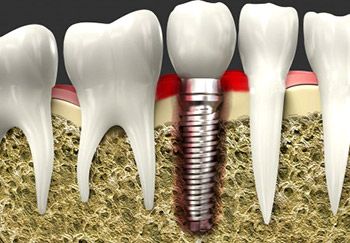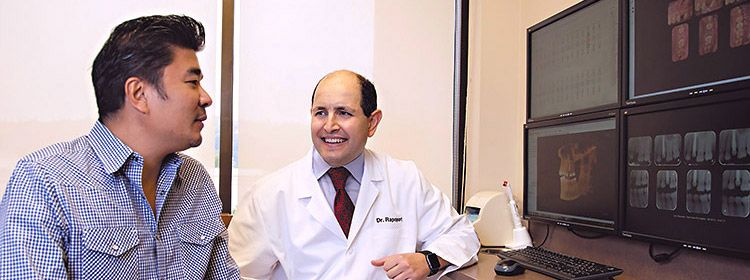Expert Treatment for Dental Implant Complications
Implants have an average success rate of over 90 percent, but Dr. Rapoport and Dr. Schuler will occasionally see new patients who had implants placed by another office in the past and who are now having problems with them. Our doctors are highly skilled and experienced in diagnosing and treating complications that can sometimes occur with dental implants.
Using our high-technology diagnostic tools, they can determine the treatment that will be most effective to restore the implant to full stability and health. If the implant has failed and cannot be saved, they will often be able to place a new implant that will be stable and long-lasting.
Types of Implant Problems

The two main issues that occur with implants are a special type of gum disease called peri-implantitis and implant failure. Peri-implantitis is an inflammatory disease that affects the gum and bone surrounding the implant and causes the loss of supporting bone, which may result in the implant becoming loose.
Peri-Implantitis Symptoms
The symptoms of peri-implantitis include swelling in the gums, a change in color of the gums, the gums bleeding while brushing, and sensitive gums. More severe symptoms include loose implants, pain, abundant bleeding, pus and visibility of the implant threads.
Main Causes of Dental Implant Complications
The leading causes of implant complications are as follows:
- #1 : Dental cement leakage – too much dental cement used to attach the crown to the implant can cause excess cement to leak out into the gums and irritate the tissues. This attracts bacteria and leads to infection.
- #2 : Incorrect implant placement – the implant is placed at the wrong angle or in an area where the bone support is inadequate—this comes under the heading of surgical errors.
Other causes include:
- Poor-fitting crowns – crowns that do not touch the adjacent teeth leave open spaces that act as food traps where bacteria can develop and cause infection
- Diabetes – people with diabetes have a weakened immune system which allows bacteria around the implant to cause infection much faster
- Smoking – there are chemicals toxic to living tissue in tobacco smoke that kills bone and gum tissue and restricts blood flow. The immune response is also impaired in tissues where the smoke makes direct contact.
Comprehensive Diagnostics

Our doctors perform comprehensive diagnostics in order to determine the best course of treatment.
Our doctors start with thorough diagnostics to troubleshoot the problem and determine the best course of treatment. They will first review your medical and dental history and take full digital photos, X-rays and when needed, a 3D CT scan.
They will check for dental cement leakage and will examine the fit of the dental restoration on top of your implant. If our doctors need to look under the gumline, they will insert an advanced miniature video camera known as a perioscope into the area between your teeth and gums. Use of the perioscope allows them to assess the state of infection or other complications without the need for surgery.
Customized, Thorough Treatment
Your treatment will depend on the problem and its cause. If the crown is faulty, our doctors will place a new crown. If bone has been lost, they will perform a bone graft to regenerate the lost bone. If there is infection, they will remove the diseased tissue and clean out the plaque and bacteria that have accumulated around your implant, using the perioscope to ensure the infection is removed completely.
They will always try to save your implant if possible. If the implant can’t be saved, they will be able to remove the implant and properly place a new one in most cases.








